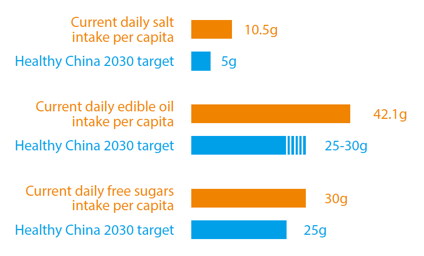
Healthy diet in China
Consuming a healthy diet throughout the lifecourse helps prevent malnutrition in all its forms, as well as a range of noncommunicable diseases and conditions. Increased production of processed food, rapid urbanization and changing lifestyles have led to a shift in dietary patterns. People are now consuming more foods high in energy, fats, free sugars or salt/sodium, and many do not eat enough fruit, vegetables and dietary fibre such as whole grains. In China, high salt and oil intakes are taking a toll on the health of adults, who consume more than double the recommended daily intake of salt, and excessive amounts of cooking oil.
An unhealthy diet containing too much salt, sugar and fat is one of the leading risk factors of obesity, cardiovascular diseases, diabetes and cancers. The exact make-up of a diversified, balanced and healthy diet will vary depending on individual needs (e.g. age, gender, lifestyle, degree of physical activity), cultural context, locally available foods and dietary customs. But basic principles of what constitute a healthy diet remain the same.

Technical links
